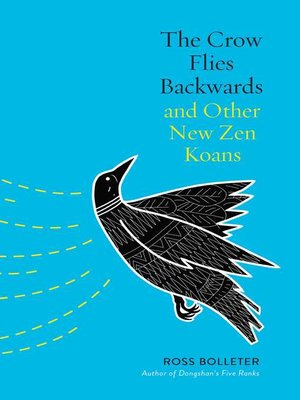
Sign up to save your library
With an OverDrive account, you can save your favorite libraries for at-a-glance information about availability. Find out more about OverDrive accounts.
Find this title in Libby, the library reading app by OverDrive.



Search for a digital library with this title
Title found at these libraries:
| Library Name | Distance |
|---|---|
| Loading... |
Discover how the mysterious, powerful form of the koan—known for bringing about sudden enlightenment—can disrupt and illuminate your everyday understanding of life.
Traditionally, Zen koans—the teaching stories of Zen—are drawn from the words and teachings of ancient masters and primarily address the concerns of (male) monastic practitioners. In The Crow Flies Backward, Ross Bolleter changes all at. The 108 modern koans offered within address sexuality and childbirth, family, parenthood, work, money and even the nature time itself. These koans are drawn from a variety of modern sources: Western philosophy, the Bible, contemporary and classic literature from Proust to Lewis Carroll and Mary Oliver and Anne Carson, as well as stories provided by author's encounters with his Zen students.
Bolleter's commentaries provide guidance to the reader on how to engage with each koan and koans in general, and direct guidance to meditate with koans. An appendix offers rarely-seen intimate and in-depth accounts of the process of koan introspection, from four of the author's senior students.
Traditionally, Zen koans—the teaching stories of Zen—are drawn from the words and teachings of ancient masters and primarily address the concerns of (male) monastic practitioners. In The Crow Flies Backward, Ross Bolleter changes all at. The 108 modern koans offered within address sexuality and childbirth, family, parenthood, work, money and even the nature time itself. These koans are drawn from a variety of modern sources: Western philosophy, the Bible, contemporary and classic literature from Proust to Lewis Carroll and Mary Oliver and Anne Carson, as well as stories provided by author's encounters with his Zen students.
Bolleter's commentaries provide guidance to the reader on how to engage with each koan and koans in general, and direct guidance to meditate with koans. An appendix offers rarely-seen intimate and in-depth accounts of the process of koan introspection, from four of the author's senior students.







